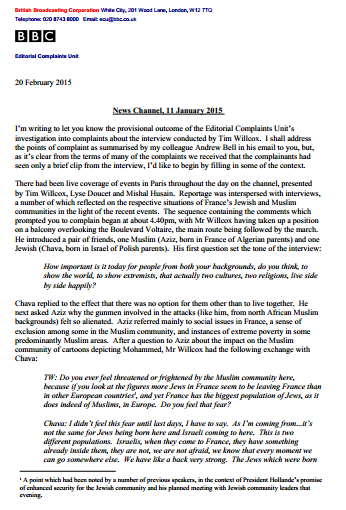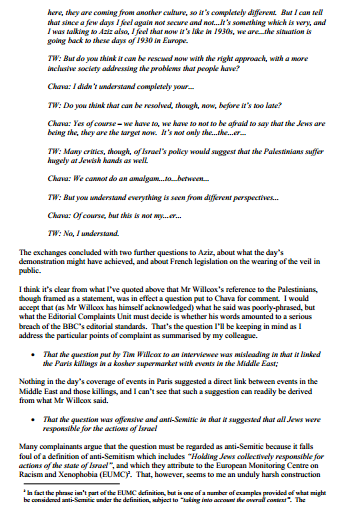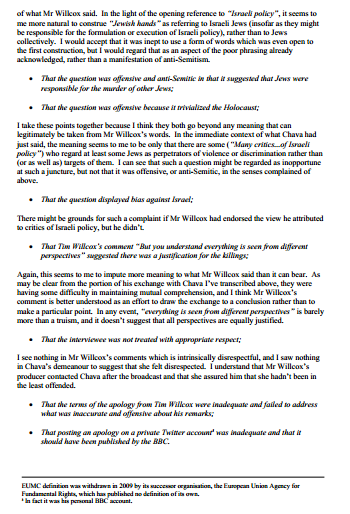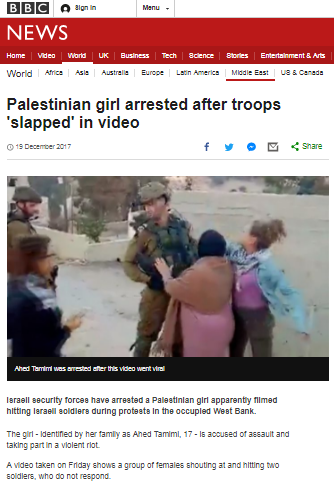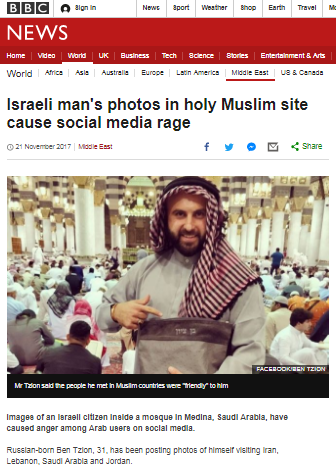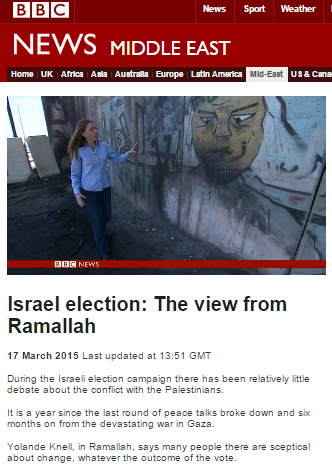Many people have written in to inform us of the response they recently received from the BBC’s Head of Editorial Complaints, Fraser Steel, concerning complaints they submitted about remarks made by Tim Willcox during BBC coverage of the rally in Paris on January 11th.
As readers will recall, the BBC initially responded to complaints by informing members of the public that Willcox had apologised for what he termed a “poorly phrased question” on Twitter. Members of the public who pursued their complaint further then received another generic response from the Complaints Director at the Editorial Complaints Unit, Andrew Bell, informing them that the BBC had decided to deal with the many complaints it had received on the issue as a single unit rather than as individual complaints. The communication most recently sent to complainants by Fraser Steel (see below – click to enlarge) summarises the provisional outcome of the ECU’s consideration of the points made in all the complaints against the relevant Editorial Guidelines of accuracy, impartiality and harm and offence.
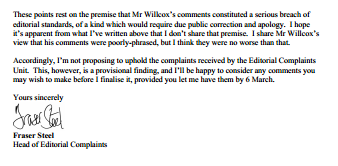 Let’s take a closer look at Steel’s interpretation of the most crucial part of the interview. As he notes, the initial question raised by Willcox raised the topic of the fears of the Jewish community in France in relation to the Muslim community in the same country.
Let’s take a closer look at Steel’s interpretation of the most crucial part of the interview. As he notes, the initial question raised by Willcox raised the topic of the fears of the Jewish community in France in relation to the Muslim community in the same country.
TW: Do you ever feel threatened or frightened by the Muslim community here, because if you look at the figures more Jews in France seem to be leaving France than in other European countries, and yet France has the biggest population of Jews, as it does indeed of Muslims, in Europe. Do you feel that fear?
His interviewee’s response noted that whilst Israelis like herself living in France feel less insecure because they have alternatives more accessible than those available to the non-Israeli Jewish population in France, nevertheless she – as an Israeli Jew living in France – felt less secure in recent days.
Chava: I didn’t feel this fear until last days, I have to say. As I’m coming from…it’s not the same for Jews being born here and Israeli coming to here. This is two different populations. Israelis, when they come to France, they have something already inside them, they are not, we are not afraid, we know that every moment we can go somewhere else. We have like a back very strong. The Jews which were born here, they are coming from another culture, so it’s completely different. But I can tell that since a few days I feel again not secure and not…It’s something which is very, and I was talking to Aziz also, I feel that now it’s like in 1930s, we are…the situation is going back to these days of 1930 in Europe.
Willcox then turned to the topic of possible solutions to that feeling of insecurity, with his interviewee expressing the opinion that the solution must include recognition of the fact that Jews living in Europe are being targeted.
TW: But do you think it can be rescued now with the right approach, with a more inclusive society addressing the problems that people have?
Chava: I didn’t understand completely your…
TW: Do you think that can be resolved, though, now, before it’s too late?
Chava: Yes of course – we have to, we have to not to be afraid to say that the Jews are being the, they are the target now. It’s not only the…the…er…
At that point Willcox inserted an interruption with which he did two things: firstly he quickly diverted the topic of conversation away from the limited framework of French Jewish and Muslim communities previously under discussion by introducing the issue of conflict in the Middle East. He also cut short discussion of the topic of the targeting of Jews in Europe by inserting a false equivalence – evident in his use of the words “as well” – in the form of ‘Palestinian suffering’ which he attributed to “Jewish hands”. In other words, Willcox falsely implied that – like Jews in France – Palestinians are targets because of their religion and/or ethnicity.
TW: Many critics, though, of Israel’s policy would suggest that the Palestinians suffer hugely at Jewish hands as well.
Chava: We cannot do an amalgam…to…between…
TW: But you understand everything is seen from different perspectives…
Chava: Of course, but this is not my…er…
TW: No, I understand.
Fraser Steel’s claim that Willcox’s statement “was in effect a question put to Chava for comment” completely ignores the issue of why Willcox found it necessary to divert the conversation away from both the events in Paris and the topic of the targeting of French Jews by interrupting his interviewee.
“I think it’s clear from what I’ve quoted above that Mr Willcox’s reference to the Palestinians, though framed as a statement, was in effect a question put to Chava for comment. I would accept that (as Mr Willcox has himself acknowledged) what he said was poorly-phrased, but what the Editorial Complaints Unit must decide is whether his words amounted to a serious breach of the BBC’s editorial standards. That’s the question I’ll be keeping in mind as I address the particular points of complaint as summarised by my colleague.
That the question put by Tim Willcox to an interviewee was misleading in that it linked the Paris killings in a kosher supermarket with events in the Middle East;
Nothing in the day’s coverage of events in Paris suggested a direct link between events in the Middle East and those killings, and I can’t see that such a suggestion can readily be derived from what Mr Willcox said.”
But that is exactly what Willcox did and it is inconceivable that Steel’s powers of English language comprehension are so limited that he cannot see it. Willcox’s statement clearly not only introduced the subject of the Middle East into the discussion but also misled BBC audiences in that it misrepresented events in the Middle East by means of the inaccurate suggestion that “Jewish hands” cause Palestinians to “suffer” because of motives identical to those of an Islamist terrorist who carried out a pre-meditated attack on identifiably Jewish targets at the Hyper Cacher supermarket.
Steel continues:
“That the question was offensive and anti-Semitic in that it suggested that all Jews were responsible for the actions of Israel
Many complainants argue that the question must be regarded as anti-Semitic because it falls foul of a definition of anti-Semitism which includes “Holding Jews collectively responsible for actions of the state of Israel”, and which they attribute to the European Monitoring Centre on Racism and Xenophobia (EUMC). That, however, seems to me an unduly harsh construction of what Mr Willcox said. In the light of the opening reference to “Israeli policy”, it seems to me more natural to construe “Jewish hands” as referring to Israeli Jews (insofar as they might be responsible for the formulation or execution of Israeli policy), rather than to Jews collectively. I would accept that it was inept to use a form of words which was even open to the first construction, but I would regard that as an aspect of the poor phrasing already acknowledged, rather than a manifestation of anti-Semitism.”
Steel’s obviously erroneous suggestion here is that “Israeli policy” is formulated and executed exclusively by “Israeli Jews”: he conveniently ignores the fact that among those formulating Israeli policy and those executing it are members of the non-Jewish communities in Israel making up over 20% of the country’s population. Hence, his transparent attempt to rewrite Willcox’s reference to “Jewish hands” to make it mean Israelis is obviously disingenuous.
It is worth noting at this point that Steel’s rejection of the classification of Willcox’s statement as antisemitic is based on the following claim inserted as a footnote:
“In fact the phrase isn’t part of the EUMC definition, but is one of a number of examples provided of what might be considered anti-Semitic under the definition, subject to “taking into account the overall context”. The EUMC definition was withdrawn in 2009 by its successor organisation, the European Union Agency for Fundamental Rights, which has published no definition of its own.”
This of course is not the first time that the BBC has exploited the fact that the European Agency for Fundamental Rights has not put out its own definition of antisemitism because its mandate does not include such activities. Whilst the EUMC Working Definition of Antisemitism was indeed removed from the FRA’s website along with other EUMC documents in 2013, it has not been “withdrawn”.
But beyond the technicalities, more importantly what we see here is that the BBC apparently believes itself to have both the authority and the expertise to make pronunciations on what is – or is not – antisemitism. Clearly that arrogant assumption flies in the face of the MacPherson Report which recommended that racist incidents should be defined as “any incident which is perceived to be racist by the victim or any other person”. Had Fraser Steel bothered to consult with expert bodies and/or representatives of the Jewish community (and there is no evidence in this document of his having done so) he might have been better placed to understand the essence of the complaints he was tasked with reviewing.
The issue of the BBC’s self-regulating complaints system is one which has been under discussion for quite some time and is likely to be raised again when the BBC’s Royal Charter comes up for renewal next year. Many people have become convinced by their experiences of navigating the system that it does not serve the interests of the corporation’s funding public and that it fails to ensure that the BBC adheres to its obligations to accuracy and impartiality.
Fraser Steel’s dismissive response to the high volume of complaints made about Tim Willcox’s statements can only further entrench the growing view that a self-regulating BBC is incompatible with the public purposes defined in its constitutional document.

